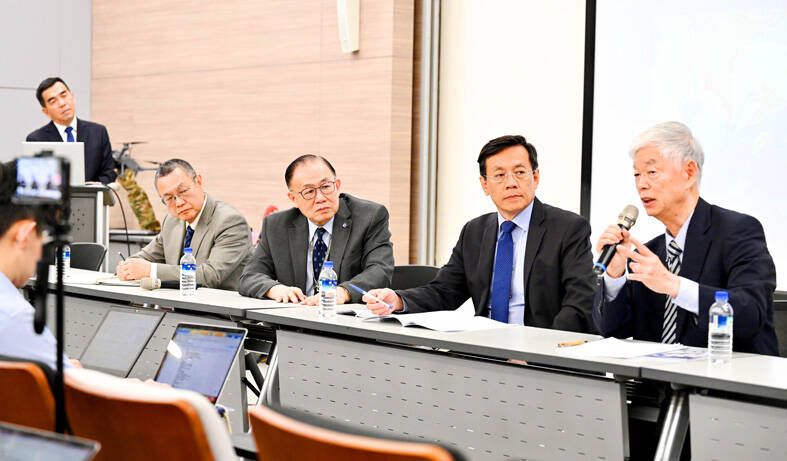The government should take precautions to prevent a financial blockade by international banks and ensure that it has enough capital to purchase wartime necessities, the results of a tabletop exercise released yesterday showed.
The tabletop exercise examined the possibility of international banks facing “external pressure” to impose a “financial blockade” on Taiwan during wartime.
It was held last month by the Asia-Pacific Policy Research Association, Taiwan Center for Security Studies Association and other organizations.

Photo: Lo Pei-de, Taipei Times
Such a blockade could result in Taiwan’s foreign-exchange reserves being transferred out of those banks’ accounts, the report said.
To prevent this from happening, Taiwan could enter into agreements with countries that support it to establish mechanisms for drawing on its foreign reserves and ensure it could purchase wartime necessities, it said.
The government should also borrow from international capital markets during peacetime, and if the borrowing limit is reached, state-run banks and enterprises, and local governments should be allowed, under strict supervision, to issue national debt to qualified foreign international investors, the report said.
The central bank could also consult with the Financial Supervisory Commission to simulate scenarios on controlling Taiwan’s foreign-exchange reserves and stock exchange, as well as when to implement significant interest rate hikes, it said, adding that the results of such simulations should be presented to the president and the premier as a reference for policymaking.
Taiwan could make an arrangement with the Federal Reserve and the Bank of Japan to use foreign capital reserves during wartime, Chinese Culture University Institute of National Development and Mainland China adjunct professor Chen Chung-hsing (陳松興) said at a news conference yesterday on the report’s findings.
Such arrangements would not be free, so Taiwan might have to use some of its overseas assets as collateral, Chen said.
With this type of mechanism in place, Taiwan’s central bank would be able to reassure the public that it would have sufficient access to its foreign-exchange reserves during a crisis, he added.
The tabletop exercise places a special emphasis on crisis prevention over crisis management, and risk management over damage control, said Chinese Nationalist Party (KMT) Legislator Chen Yeong-kang (陳永康), a retired Navy admiral who organized the exercise.
The holistic exercise covers various fields, from financial to energy security and the continued functioning of industries during war, thereby helping the country develop resilience, the lawmaker said.

The Ministry of Foreign Affairs (MOFA) yesterday voiced dissatisfaction with the Comprehensive and Progressive Agreement for Trans- Pacific Partnership (CPTPP), whose latest meeting, concluded earlier the same day, appeared not to address the country’s application. In a statement, MOFA said the CPTPP commission had "once again failed to fairly process Taiwan’s application," attributing the inaction to the bloc’s "succumbing to political pressure," without elaborating. Taiwan submitted its CPTPP application under the name "Separate Customs Territory of Taiwan, Penghu, Kinmen and Matsu" on Sept. 22, 2021 -- less than a week after China

ALIGNED THINKING: Taiwan and Japan have a mutual interest in trade, culture and engineering, and can work together for stability, Cho Jung-tai said Taiwan and Japan are two like-minded countries willing to work together to form a “safety barrier” in the Indo-Pacific region, Premier Cho Jung-tai (卓榮泰) yesterday said at the opening ceremony of the 35th Taiwan-Japan Modern Engineering and Technology Symposium in Taipei. Taiwan and Japan are close geographically and closer emotionally, he added. Citing the overflowing of a barrier lake in the Mataian River (馬太鞍溪) in September, Cho said the submersible water level sensors given by Japan during the disaster helped Taiwan monitor the lake’s water levels more accurately. Japan also provided a lot of vaccines early in the outbreak of the COVID-19 pandemic,

Kaohsiung Mayor Chen Chi-mai (陳其邁) on Monday announced light shows and themed traffic lights to welcome fans of South Korean pop group Twice to the port city. The group is to play Kaohsiung on Saturday as part of its “This Is For” world tour. It would be the group’s first performance in Taiwan since its debut 10 years ago. The all-female group consists of five South Koreans, three Japanese and Tainan’s Chou Tzu-yu (周子瑜), the first Taiwan-born and raised member of a South Korean girl group. To promote the group’s arrival, the city has been holding a series of events, including a pop-up

A home-style restaurant opened by a Taiwanese woman in Quezon City in Metro Manila has been featured in the first-ever Michelin Guide honoring exceptional restaurants in the Philippines. The restaurant, Fong Wei Wu (豐味屋), was one of 74 eateries to receive a “Michelin Selected” honor in the guide, while one restaurant received two Michelin stars, eight received one star and 25 were awarded a “Bib Gourmand.” The guide, which was limited to restaurants in Metro Manila and Cebu, was published on Oct. 30. In an interview, Feng Wei Wu’s owner and chef, Linda, said that as a restaurateur in her 60s, receiving an